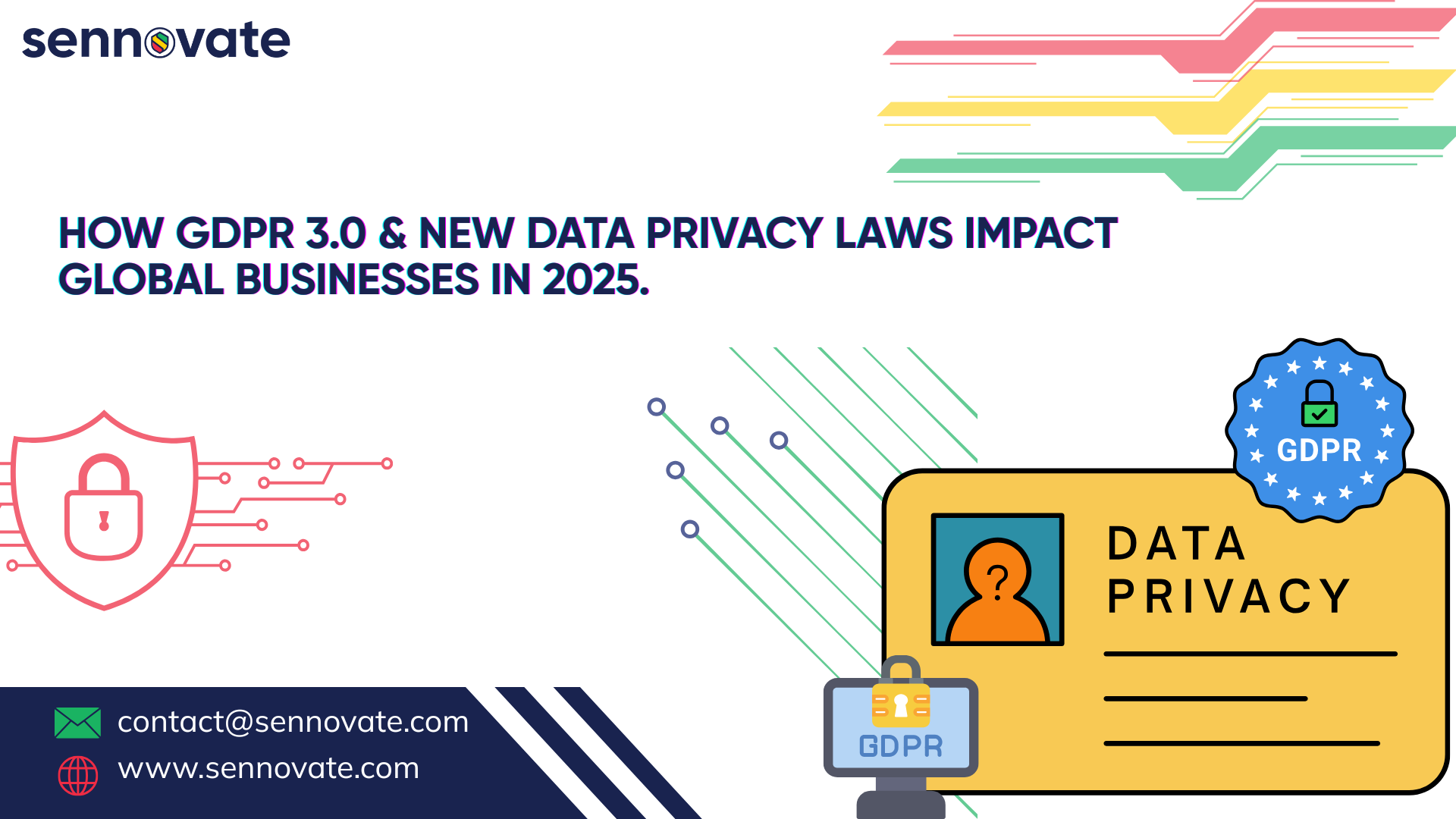

How GDPR 3.0 & New Data Privacy Laws Impact Global Businesses in 2025.
Data privacy regulations are experiencing a significant transformation in 2025. With GDPR 3.0 approaching and more stringent state laws in the United States being introduced, companies around the globe are confronted with new compliance hurdles. The consequences of non-compliance are not only perilous but also costly, with penalties potentially reaching €20 million or 4% of global revenue as stipulated by GDPR.
This detailed guide explores:
✔ Major updates in GDPR 3.0
✔ Recent US data privacy legislation (CPRA, CDPA, etc.)
✔ Regulation of AI and cross-border data transfers
✔ Practical compliance strategies
✔ The role of Sennovate’s cybersecurity services in the USA in assisting businesses to adapt
1. GDPR 3.0: What’s New in 2025?
Three Major Updates
- AI Governance Mandates
- Requires Algorithm Impact Assessments for automated decision-making
- Bans “high-risk” AI profiling in hiring, lending, and law enforcement
- Stricter Consent Rules
- “Dark patterns” that trick users into consent are now illegal
- Cookie banners must offer equal-visibility opt-out options
- Extended Liability
- Cloud providers now jointly liable for customer data breaches
- Parent companies responsible for subsidiaries’ violations
📌 Case Study: A German SaaS firm was fined €8.2M in 2024 for non-compliant AI recruitment tools.
2. US Privacy Law Expansion: A Patchwork Quilt


Federal Developments
- American Data Privacy Protection Act (ADPPA) stalled, but…
- FTC’s “Commercial Surveillance” Rules now require:
- Annual data minimization audits
- 48-hour breach reporting for health/financial data
3. The Global Domino Effect
Notable 2025 Regulations
- Brazil’s LGPD Amendment: Mandates local data storage for health records
- India’s DPDPA: Requires consent managers for data collection
- China’s PIPL Update: Demands security certifications for data exports
📌 Stat: 83% of multinationals will need regional compliance teams by 2025 (Gartner).
4. Cybersecurity Implications
New Technical Requirements
- Pseudonymization by Default
- GDPR 3.0 treats encrypted data differently from pseudonymized data
- Must implement FIPS 140-3 validated encryption
- Real-Time DSAR Compliance
- Data Subject Access Requests (DSARs) must be fulfilled in 72 hours (down from 30 days)
- AI Transparency
- Must document:
- Training data sources
- Bias mitigation steps
- Human oversight protocols
- Must document:
5. Compliance Roadmap for 2025
Immediate Actions
✅ Data Mapping 2.0
- Tag data flows with:
- Jurisdiction
- Consent status
- Retention deadlines
✅ Privacy Engineering
- Embed “privacy by design” into:
- Software development
- Cloud architectures
- IoT devices
✅ Vendor Management
- New contract clauses required:
- Data protection addendums
- Breach notification SLAs
6. How Sennovate Helps Businesses Adapt
As a leading cybersecurity services provider in the USA, we offer:
🔹 GDPR 3.0 Readiness Assessments
- Gap analysis against 23 new articles
🔹 Automated DSAR Solutions
- AI-powered data discovery & redaction
🔹 Compliance-as-a-Service
- Continuous monitoring for:
- CPRA
- NYPA
- PIPL
🔹 Privacy-Aware Security
- Zero-trust architectures that satisfy:
- NIST Privacy Framework
- ISO 27701
📞 Schedule a Free Privacy Audit – Avoid 2025’s steep penalties.
Privacy as a Competitive Edge
With the implementation of GDPR 3.0 and over 27 new regulations, compliance has transitioned from being optional to a strategic necessity. Companies that take proactive measures now will:
✔ Steer clear of substantial penalties (up to $100 million under NYPA)
✔ Foster customer confidence (72% of consumers favor brands that prioritize privacy)
✔ Safeguard their operations against future regulations
Do not delay until enforcement begins—collaborate with Sennovate today.



